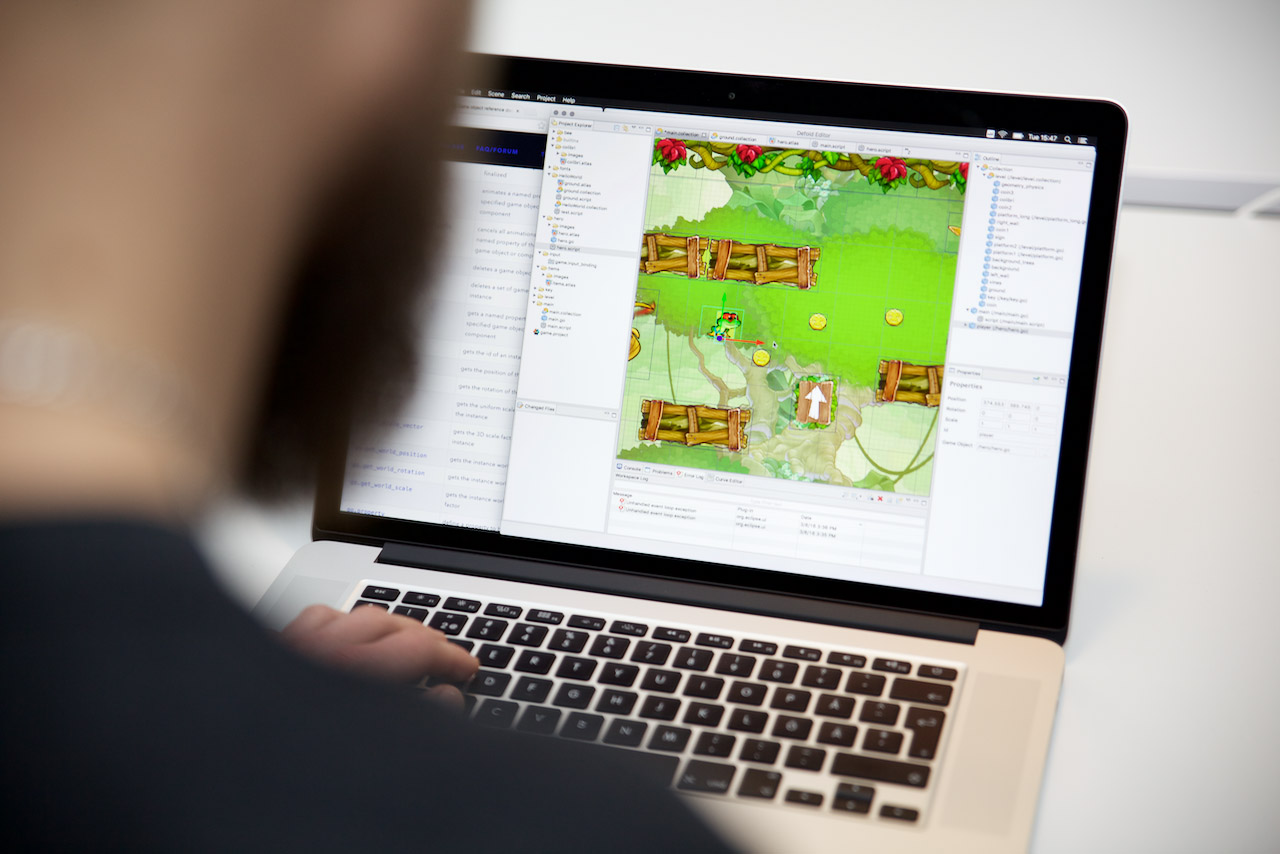At GDC 2016 King presented the Defold that is now available for anyone who wants to make games, pointing out its advantages as being lightweight, cross-platform, highly optimized and aimed on cross-function teams. Gamesauce tried to define the niche Defold is aiming to occupy in the settled and competitive engines market, with known favorites for both aspiring and experienced devs, and why King thinks their engine has high chances for success.
King’s CTO and co-founder Thomas Hartwig explained his vision of why Defold has its specific audience to engage.
“From the beginning, when we started to have our own engine, we wanted some control over our abilities to target games for multiple platforms, we didn’t want to be locked into big engine providers. But at the same time we love technology, so hoped to set our developers with our own stuff, and we believe we can give the games that certain look, create a King-ish feeling. It’s the main reason why we started to develop our own stuff, a long time ago”, Thomas recalls. “Unity was quite new at the market at that time, so we didn’t find any good alternative, and decided to make our own software. And that must have been in 2011”.
Neat Enough to Share with the World
At King, the team uses 2 engines: while the 2D Defold is now available publicly (they thought it would give the most value to other developers out there since it’s the most organized and easy to pick up for new people), the other one is 3D-focused and not as neatly wrapped as the 2D Defold, so the 3D version is more for internal use. However, it’s still up to each team which one to choose, depending on their purpose: Defold is recommended for those who do 2D and want to iterate and see results quickly, the other engine is for 3D and C++.

“I think that if you haven’t developed any mobile games before, it’s like this: you download the Defold binary, and you’ve got everything you need to create a mobile game. The software has a building system for you to share code if your team is more than one developer, and we take care of hosting it, so you don’t have to think about version control systems and all that stuff. And you can see the performance of your game once you go live. You just activate it. It’s called Defold Analytics”, Thomas explains.
Gamesauce: How easy or hard is Defold to pick up for a beginner dev?
Thomas: “The main thing, as for me, is that as long as you are a developer or know how to program — you can pick it up regardless of language. You can be a C++ developer or a web developer for Action Script, or a Flash developer. I also think that anyone can start using the features of the engine and make games, the big thing about Defold is that it’s so easy for everyone to start using. And as long as you have passion for games and know about programming, then you can make an awesome game. Though I think that if you have no previous experience, there might be some learning curve. But again, once you get a hang of it, Defold has the potential to follow you from a simple project to a very advanced one where you go really deep into technical stuff. So it’s both for long-term and short-term.”
Gamesauce: How do you create and engage the community around the new engine?
Thomas: “Since we just recently started, there are fairly active forums on defold.com where you can browse questions and take part in solving problems other people are encountering.”
“We’ve been trying to create a lot of different tutorials on how to get started. When you say — ok I wanna create a new game project, you can do it from a completely blank page, or a template. We have a side-scroller template, for example: you get the source code and can play around with it. There are template projects for different genres of games.”

Gamesauce: How about hints in the beginning of engine use?
Thomas: “When you start playing our King.com games you kinda have a tutorial, but we don’t have that in the engine right now. There are small tips like how to reload the game, but you mostly have to turn to manuals and tutorials available through the website. That is basically how you get all the information. Along with these tutorials we have highlighted some projects from indie developers. We try to get the learnings and their experience through their stories, including how they found the development process using Defold for the first time, and then the forums again — which I think is what I’d normally turn to during development when a question arises.”
How to bring creativity back to the team
Gamesauce: How do you engage early adopters so that they’d share their experience?
Thomas: “We set up the Defold team in a way that there’s a core team working on the new engine stuff, and then we have people who focus on the public version. But everyone is on duty when it comes to answering questions, all the developers in the team are very keen on making sure that external and internal King users get the best possible support.”



Gamesauce: How exactly does the King team use Defold?
Thomas: “We launched a game using this engine, it’s called Blossom Blast Saga, in November last year. And then we have a number of games in the pipeline, that haven’t been announced yet. When we started with this first game product, Blossom Blast, we actually gave the team a challenge. We said — okay, can you reduce the number of team members and shorten the time it takes to actually ship the game? We said “you will be using Defold, you haven’t previously launched a mobile game, can you do it?” And they were like — yeah, we can do it. They managed to develop with a much smaller team than we usually have when we upgrade a Saga game. And thanks to the shorter time of work, the creativity came back to the team. Before we had Defold it took a lot of time before you actually made a change in a game, and even more to see it on a device. Now you can see the changes right away which is pretty awesome.”

Gamesauce: How do you see your target audience?
Thomas: “I think Defold has been developed for cross-functional teams. Developing a game, you need artists, game designers, developers, and with Defold all these people can build a game and get it on a device themselves without having to be super technical. They can do modifications or move a button from one corner to another and see the changes on the device, so I think for King it has brought the team together more. All that latency and waiting we had before kills creativity and the passion of creating games, because you end up waiting, and that’s boring. It also comes down to the willingness to polish your game. If you see something in the game that you don’t want and would like to fix, you put it on sort of to-do list, and then never get to it. With Defold you can fix it directly. It’s a fantastic feeling and basically what we love.”
Thomas remarks that even though the engine has been designed primarily for games, creations like short movies can also be made with it. All one needs to start using Defold is download the software from the website and sign up with their Google account, since the project database is managed online, that’s where the project is being created and where you see the analytics.


Gamesauce: How about the assets store?
Thomas: “The engine doesn’t provide you with any sort of assets or images, so you need to build your project from scratch. That’s because it’s really hard to provide an assets library for everyone who wants to do their unique game. If the users request it, we might go for it. We are very much community-driven, so will mix together what they want and what our internal team needs to have within the engine.”

Gamesauce: Why would a developer choose the new Defold and not one of those known and established engines?
Thomas: “I think they are good at different things. I’m focused on making sure that Defold becomes a good alternative for the people who want to use it. I don’t think we’re going this way - ‘we’re going to beat Unity’, because we don’t care about this. They are an awesome product. And we just want to make sure than Defold becomes an awesome product for King to use, and for the developers picking it up. I do know the strengths of Defold: get something on the screen and iterate fast, it’s a lightweight engine, it’s very optimized.”
Comments










